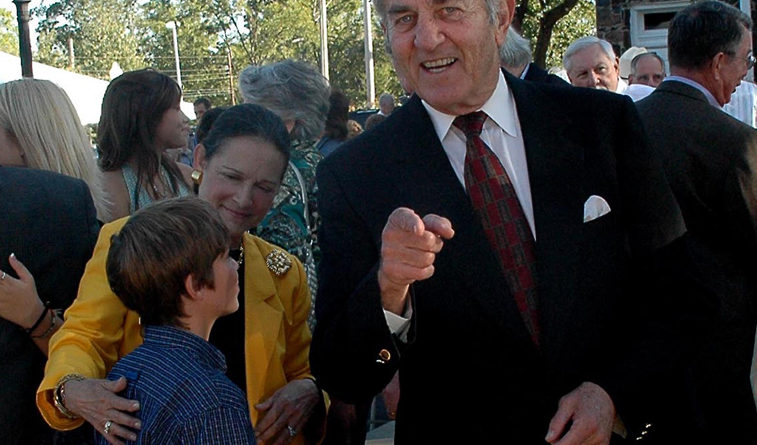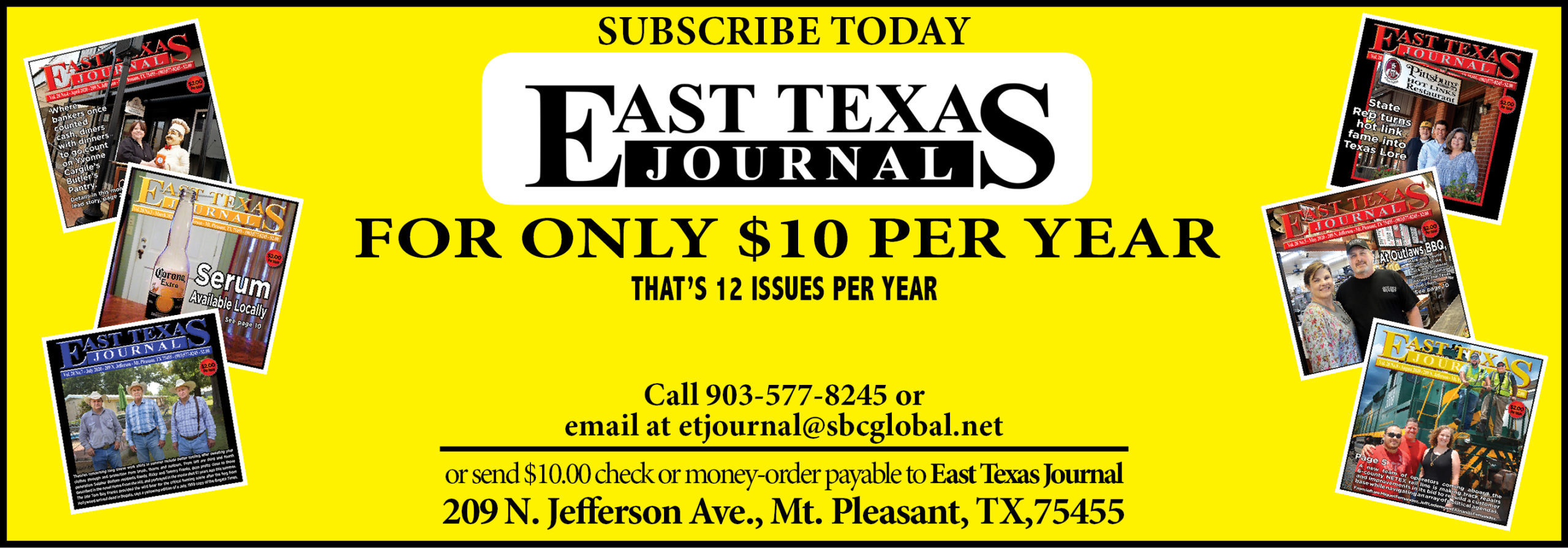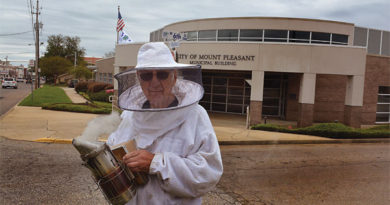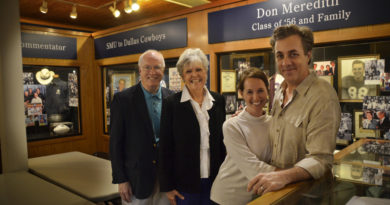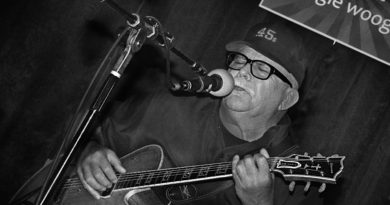Meredith’s Son Lands NFL Film for Home Team

MT. VERNON – Described the next day by Sports Illustrated’s Peter King as “one of the most interesting shows in history,” one hour before The Ice Bowl played as the latest in the NFL network’s Time Line series, it played in Mt. Vernon.
From the mist of half a century back on a 15-below-zero day when the wind chill was hitting 50 below in Green Bay, Dallas Cowboy running back Walt Garrison aired a sideline memory, words frozen like a brand burned in his skull.
“Meredith,” he said to his quarterback as they considered the weather, “we’ve got to be the dumbest (expletive, delete) in the world,” he said.
Salutatorian of the Mt. Vernon class of 1954, Don Meredith had a ready answer.
Thumbing over his shoulder to the fan-packed stadium, he said, “Nah, look behind us.”
In 1967, for a second consecutive year, the Cowboys and Packers met for the National League Championship and a ticket to the Super Bowl. The ferocity of the live or die game matched the brute field frozen hard as stone. More than a Super Bowl dream, Dallas played for revenge.
A year before, the Packers broke the Cowboys’ hearts 34-27.
Engineering a comeback from a 14-point deficit in the re-match, late on that New Year’s Eve afternoon, Meredith called a halfback pass from Dan Reeves to Lance Rentzel that gave the Cowboys a 17-14 lead.
Written, narrated and produced by Michael Meredith, a film more than four years in the making changed from a quest in memory of his father to a documentary on a national stage when the NFL bought into the vision.
“It started out as a research project that turned into a way for Michael to discover more of who his father was,” said Troy Word, the friend and New York-based photographer following Michael Meredith across nine states pulling together memories of players who lived the story.

“Everything written about the game before is by-the-book dry in comparison,” said Mr. Word. “I got the sense that the chance to talk to his son was a second chance for players to say the things they wished they’d said to his father.
“As the work advanced, Michael approached the NFL because he needed archived film footage of the game to tell the story,” Mr. Word said. “What he found among the archivists was that Don Meredith was their favorite NFL legend. Add that the Ice Bowl is arguably the most legendary game in the league’s history and everybody sensed that working together the documentary could be something larger than the sum of its parts.”

Research led the filmmaker to the hometown his father made famous after transforming himself from player to actor to a Monday night football commentator delighting in spinning stories of Mt. Vernon.
“If the Cowboys became America’s team, Don Meredith turned Monday Night Football into the stage featuring Mt. Vernon as America’s home town,” said 1st National Bank President Ken Greer, who was the volunteer docent working the Don Meredith Exhibit at the Fire Station Museum when Michael Meredith came to town.
“During the Monday Night Football years, Don Meredith was a weekly guest in America’s living room,” Mr. Greer said.
With the Ice Bowl documentary’s national broadcast waiting in the wings, Michael Meredith brought his film to the second floor of what was a hardware store with a sideline in casket sales and funeral service when Jeff and Hazel Meredith’s baby boy wriggled into town in the spring of 1938.
Anywhere else on the planet, it would have been an odd venue. While he first came here in search of more of his father’s story, Michael Meredith returned with the film as a gift to himself.
“It’s a selfish choice,” he said. While professional life roots him in New York’s Greenwich Village, “I feel like I’ve found my hometown in Texas,” he said, understanding why wherever his nomadic father’s life led, Don Meredith always took a slice of Mt. Vernon along.
League officials assumed The Ice Bowl’s Texas premier would be in Dallas, the Cowboys’ hometown. That was before Michael Meredith made clear the NFL missed that call and argued his prevailing case for Mt. Vernon.
On game day, the heating system that was to have kept the field from freezing condensed the cold to a mist that flash froze in a glaze of grass-spiked ice when the field crew rolled back the tarp.
“It was like playing on a frozen pond,” Mr. Garrison said, “slicker than snot on a doorknob.”
Compared to more colorful Garrison commentary that didn’t make the documentary cut, that line’s pedestrian stuff, Mr. Word said.
His work began when he and Michael flew from New York to Alabama to interview Bart Star, the quarterback who crushed the Cowboy’s dreams that day with a game-ending quarterback sneak into the end zone – final score, 21-17, Green Bay.
The game’s dramatic close cast the Green Bay quarterback as its star.
“They’d never met before, but Michael looks so much like his father that from the first moment there was this sense of Bart Star trusting Michael with memories he treasures,” Mr. Word said.
“We stayed and visited and filmed for a couple of days,” Mr. Word said, going on to describe “this gracious man of such warmth – Bart Star was so generous, complimentary, kind, elegant – just an amazing man. He took us to dinner, invited us into his home – it was a phenomenon in that it came to represent the reception Michael was given time after time in interview after interview.
“Among the Dallas players the interviews moved beyond football into what Dallas was at that time – a place branded as the city of hate after the Kennedy assassination,” Mr. Word said, describing a mood that rippled through the land.
Between the Ice Bowl and the end of the following season the assassinations of Martin Luther King and Robert Kennedy ignited rioting in the streets across the nation. With retrospect filtering a river of years, it’s easier to see the second story of tragedy turned to triumph by players whose spirit gave rise to the Dallas era of the Cowboys as America’s team.
“Particularly in Dallas, the stories we heard starting with the Ice Bowl as a focal point move through time describing the team’s impact on the city – the more we worked, the more ideas began taking life,” Mr. Word said. Four years work on the documentary is shaping up as the springboard for launching a feature length project, The First Cowboys.
In the years that followed The Ice Bowl, the heart of the Cowboys revealed that day produced winners and pumped hope through Dallas as the city and the nation emerged from dark times and tumultuous years.
“There’s so much more to the story of the team,” said Mr. Word.
More than is revealed in the documentary, players’ tales shined over Don Meredith’s humor, a nature that “kept everybody laughing because it kept the team loose,” Mr. Word said. “The more tense the situation, the more he could find the humor in the moment. It’s something that can be easily misread as a lack of focus outside the huddle where he was the clear team leader.
“The positive result – even after he was gone, the team had a kind of swagger, a confidence that drove their success in the seasons that followed,” Mr. Word said. “They were gunslingers. They came to represent hope. They brought pride to a city looking for distraction, escape from a tough period. The Cowboys became an enormously significant thing.
“The thing driving Michael’s plunging into the story was that his father never talked about that game,” said Mr. Word. For the quarterback, the silence that settled over the plane ride home in its aftermath never ended.
“There wasn’t a word said,” remembered Lance Rentzel.
Michael Meredith was just over three months old that day, at home in Dallas with his mother whose grief for the man who was her husband then still lingers.
Cheryl King said what Don Meredith never would.
“It was more than heartbreaking,” she said. “It wounded my soul. You never get over a thing like that.”
Don Meredith played one more season, then stunned everyone by retiring before the start of the season of 1969.
There’s a hollow moment in the story, a quick clip from a press conference in which the quarterback branded by the press as a cavalier spirit confesses retiring into uncertainty, not knowing what would come next and only that he was leaving the game he loved.
A story element not included in the documentary crashes into the barrier separating the colorful spirit of the quarterback from the stoic demeanor of Tom Landry, the coach whose game day uniform was a business suit beneath stiff upper lip shaded by his fedora.
“I’ve never seen him smile,” Walt Garrison is quoted as once saying, “but then I’ve only known him nine years.”
At “knowyourcowboys.com,” you’ll find this among Don Meredith’s best one liners: “Tom Landry is a perfectionist. If he was married to Raquel Welsh, he’d expect her to cook.”
What was seldom reported was the bitterness of fans when the Cowboys lost, a bitterness often taking dead aim not at the coaches, not at the team, but directly at the quarterback.
“What, because I like having fun they think I’m not serious?” he asked on a rare occasion that he responded to sharp critics.
Don and Cheryl divorced when Michael was 4. His memories include Willie Nelson making the Meredith home a regular layover when he lived on the road in the years before his music made him a star.
When the outcome of a Monday night game became evident, Meredith’s crooning Nelson’s lyrics, “Turn out the lights, the party’s over,” turned into a trademark for a man who practiced his singing in the team huddle. The day after he died, his buddy Walt Garrison talked about being one of few having a copy of Don Meredith’s country music single, cut on a 45 during his playing days. On one side there’s “Travelin’ Man,” and on the other, “Them That Aint Got It Can’t Lose.”
After his parents divorced, the film maker’s father moved on to Beverly Hills, New York and Santa Fe; his mother made homes in Fort Worth, Houston and for a while in an “ashram” – a spiritual hermitage, a sort of monastery in India.
Michael lived times with both, attended eight schools before being spit out with a diploma in Utah, then heading for the University of Texas where he made the Longhorn football team as a walk-on receiver who never played much.
In the years that followed his years as the child of nomads, a period during which his father dubbed him a “Roads Scholar,” Michael Meredith nested in New York, rooming some with Mr. Word before each moved on, but remained friends linked by their work in the film industry.
Michael and wife, Amit, are the anchors of Maximon Pictures, founded in 2002. Maximon, says the Internet, is a Guatemalan saint from ancient Mayan traditions, a regular drinker who works to reconcile religious traditions, offers protection and enjoys gifts including tobacco, liquor, cash and tortillas.
Maximon Pictures is a film company that’s produced award winning and critically acclaimed projects, an enterprise founded by the son of the man who once said he left Mt. Vernon for Dallas to play at SMU because it was “close to home and easy to spell.”
While earning gridiron status as an All American during his Southern Methodist University days, Don Meredith’s followers began referring to SMU as “Southern Meredith University.”
The Ice Bowl documentary comes through a side door taking a short cut through Don Meredith’s tenure as an actor in movies, television roles and the only spokesman ever booked for TV time pushing Lipton ice tea.

Michael Meredith found a sound test clip of his father, dead panning the camera as he let this one loose: “Roll three, Don Meredith, Jeff and Hazel’s baby boy out of Mt. Vernon Texas riding Twelve Jumps to Midnight, take a deep seat cowboy, it’s a long ride.”
Among the player interviews was Roger Staubach, the quarterback who two seasons after Meredith’s retirement took Dallas to its first Super Bowl.
For leading the team to championships, Roger Staubach has been voted by fans as the most famous Cowboy of all times, the quarterback dubbed “Captain America” after the press corps re-defined Dallas as America’s team.
Remembering the father while talking to the son, Roger Staubach said of the rise of the Cowboy champions, “That was Meredith’s team. He should have been there.”

